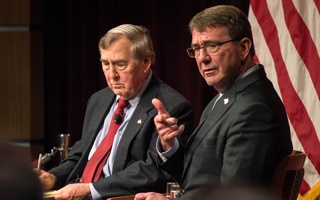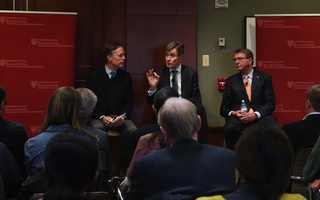U.S. Secretary of Defense Ashton B. Carter addressed a packed crowd at Harvard’s Institute of Politics on Tuesday night, touching on U.S. military recruitment, efforts to eliminate the Islamic State, and disputes in the South China Sea.
Despite calling the U.S. military the “finest fighting force in the world,” Carter pointed out what he described as the trend of technological innovation shifting away from the U.S. government toward the private sector. He stressed the need to rebuild trust with technology companies and recruit top-flight talent.
“In order to remain the best...we need to have access to the best technology,” Carter said.
Carter, who previously served as a professor at the Kennedy School of Government, praised Boston and Cambridge area leadership in life science research and the biotechnology sector as an example of what the military is looking for in its next generation of leaders. {shortcode-f4195363652e8f45fcc138d4db6a1665c1ba3879}
Carter, in an earlier interview, also brought up the the Defense Department’s new initiative, the Force of the Future, which aims to improve the Department’s recruitment of top talent.
“I’m very intent upon making us a more attractive and welcoming place for a new generation of people,” he said.
Specific reforms include improving internships and fellowships aimed at college students and graduates, creating more positions for civilians in technology and human resources, and providing opportunities for employees to both gain experience in the private sector and implement successful approaches in the military.
Carter also discussed the U.S. military’s ongoing efforts to eliminate the extremist group that calls itself the Islamic State. Those efforts include using both airstrikes and an “expeditionary force” that would perform raids and gather intelligence in Islamic State territory with the approval of local governments, Carter said.
He also emphasized the importance of a collective effort, saying that other important actors, like Russia and local Syrian and Iraqi forces, need to play their parts as well in combating terrorism.
“The U.S. is, and I think must, lead in this fight,” Carter said. “But we need others to go with us.”
Speaking about disputes in the South China Sea, Carter criticized the territorial claims and militarization, as well as efforts to dredge new islands, made by China and other countries, calling them damaging to stability in the region.
“I’m not one of the people who believes that war, cold or otherwise, with China is likely,” Carter said. “Certainly not desirable.”
Carter argued that maintaining peace in Asia through diplomacy and inclusion is of the greatest long-term importance: This goal, he said, necessitates resolving territorial disputes peacefully and working with countries like China to combat piracy and human trafficking and to promote free commerce.
“Our approach is not to exclude—our approach is to include,” Carter said. “But if they self-exclude by behaving this way, then look what will happen.”
When asked by audience members about religious freedom, sexual assault in the military, and cyber security, Carter stressed the importance of being inclusive and transparent to attract people from all backgrounds to the Defense Department.
“We have an all-volunteer force,” Carter said. “The only way to stay good is to make sure we’re drawing from the largest possible pool.”Read more in University News
At Vigil, Harvard Honors World AIDS DayRecommended Articles
-
No HeadlineMr. James C. Carter of the Board of Overseers, has been invited to respond to the toast, Harvard, at the
-
Carters 13; College Nine 3.The College Nine was badly beaten by the Carter Base Ball Club at Franklin last Saturday. Although the College was
-
Prof. Beale Before St. Paul's SocietyProfessor Joseph Henry Beale '82, Carter Professor of General Jurisprudence in the Law School, will speak on "Discipline" at the
-
 Former Defense Secretary Discusses Military Innovation
Former Defense Secretary Discusses Military Innovation -
 Former U.K. Intelligence Chief Speaks at Kennedy School
Former U.K. Intelligence Chief Speaks at Kennedy School













